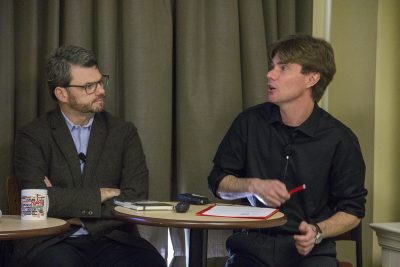
Approximately 30 Boston University students and staff gathered Wednesday afternoon in the Frederick S. Pardee Center for the Study of the Longer-Range Future on Bay State Road for a seminar entitled “Financing Global Climate Change Commitments: The Role of Public Finance.” The seminar presented ideas based on research done by faculty at BU.
Pardee Center Director Anthony Janetos moderated a panel of three professors from the Frederick S. Pardee School of Global Studies to discuss their research. Before the seminar, Janetos said this kind of panel is a common way to present faculty research to the BU community.
“Why we decided to host it is simple,” Janetos said. “We have BU faculty and colleagues who have done a lot of research in this area, and we’re having them discuss their work.”
Janetos said global climate change financing is a topic frequently studied by Pardee faculty.
“This is a topic that continues to be important, and it is generally one of the main topics of faculty research here because of its broad global importance,” Janetos said.
After introducing the seminar, Janetos opened up the floor to the panelists.
Director of Curricular Innovation and Initiatives Henrik Selin, one of the three speakers, said the seminar would essentially be short presentations based on papers written and published by him and the other two panelists.
Selin began the discussion by speaking about his own research concerning the steps that need to be taken globally in improving financing climate change commitments.
“Whether you’re a large country or a small country, whether you’re a poor country or a rich country, whether you’re in the global South or the global North, you should start designing your own domestic development policy and take action … on climate change,” Selin said.
Miquel Muñoz, a research fellow at the Global Economic Governance Initiative, spoke about the complexity of this financing.
“There’s never going to be an agreement, but I think good measures of some magnitude are possible,” he said.
Kevin Gallagher, the co-director of the Global Economic Governance Initiative, spoke about the importance of involving the public and private sector in this global project on climate change.
“We need to take a step back here and think about our ultimate goal, and about what is the role of public finance in it,” Gallagher said.
Gallagher spoke about how, when it comes to financing climate change commitments, increasing public funding is important in encouraging private funding.
“The most conservative estimates of what we need, just in terms of clean energy, is one trillion dollars worth of investment in clean energy every year for the next 15 years,” Gallagher said. “The private market is currently only supplying about a quarter of that … and that’s just the energy sector, there are many other areas that are also in need of major funding.”
Several students who attended the discussion said financing climate change commitments felt like an important topic to think about, especially in today’s political climate.
Sana Haque, a first-year graduate student in Pardee and the College of Communication, said President Donald Trump’s first few days in office prompted her desire to learn more about what consequences his policies might have.
“[The reason I came] is probably the current crisis we’re having with Trump’s policies and policies towards the environment and EPA, and I just wanted to hear more about that,” Haque said.
Natasha Patel, a senior in the College of Arts and Sciences, said the administration of Trump will have impacts on the United States and other countries.
“I think because of President Trump, you need to bear in mind that he just froze all funding for the EPA, and so many organizations internationally depend on funding for the EPA for research and for initiatives,” Patel said. “So seeing how he can fill that gap is really important.”














